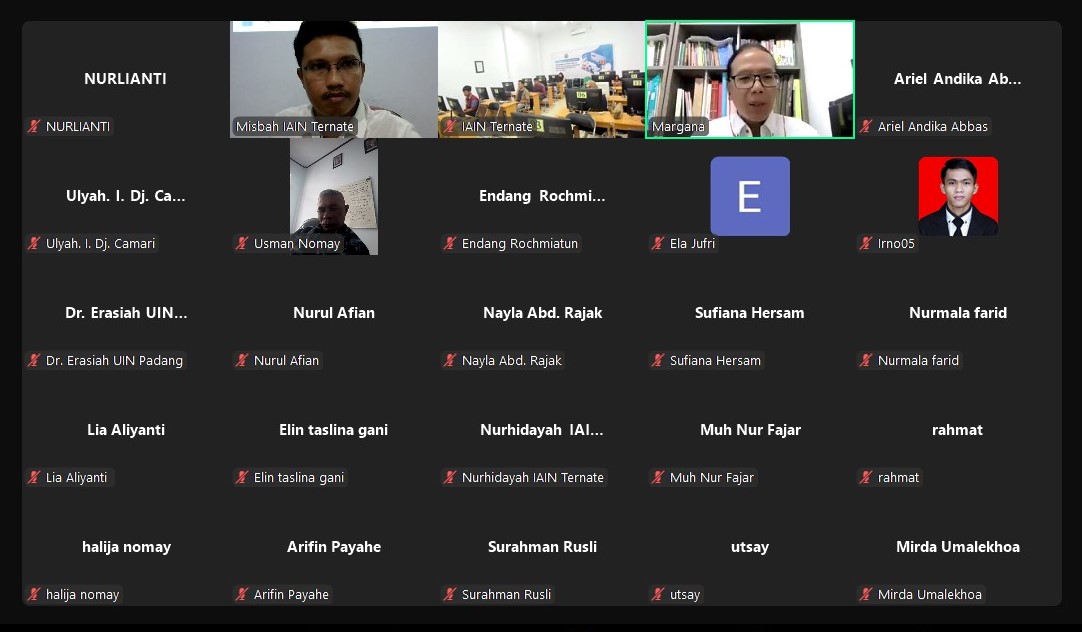
Islamic Civilization History Study Program FUAD IAIN Ternate Holds National Webinar, Discusses Regional Expansion Issues
TERNATE – The Islamic civilization history study program (SPI) of the Faculty of Usuluddin Adab and Da'wah (FUAD) of the State Islamic Institute (IAIN) Ternate, North Maluku, again held a national webinar for students and lecturers, Monday (11/25/2024).
This national webinar activity presented a lecturer from the Department of History, Faculty of Cultural Sciences (FIB) Universitas Gadjah Mada (UGM) Yogyakarta, Dr. Sri Margana, M.Hum., M.Phil, and a lecturer from FUAD IAIN Ternate Dr. Makbul A.H Din, M.Si as speakers.
The national webinar took place via zoom meeting, entitled Reformation, Decentralization, and Conflicts of Regional Expansion in Indonesia, attended by educators, and students of FUAD IAIN Ternate, as well as the general public.
The coordinator of the SPI FUAD IAIN Ternate study program, Misbahuddin S.PdI., M.Hum after the national webinar activity said that the implementation of the national webinar was also attended by lecturers and students from UIN Imam Bonjol Padang, UIN Alauddin Makassar, UIN Siber Syekh Nurjati Cirebon, IAIN Palangka Raya, IAIN Parepare, Makassar State University and Khairun Ternate University.
He explained that the material presented by the speakers was related to the division of regions, and the administrative structure of Indonesia, as well as regulations on decentralization and regional expansion from the colonial period to the independence period.
In addition, he revealed that the speakers also touched on the birth of Law Number 22 of 1999 concerning regional government, which triggered the phenomenon of regional expansion.
"The regulation is the trigger for regional expansion, because since 1999-2009, 7 provinces, 164 districts and 34 cities have formed new autonomous regions (DOB), so that a total of 205 DOBs have been added within 10 years or an average of 20 DOBs per year," said Misbahuddin, imitating the explanation given by Dr. Sri Margana, M.Hum., M.Phil.
Regarding regional expansion, he continued, as conveyed by the two speakers, there are reasons behind the proposal for a region to be expanded, namely the rhetoric of regional expansion and the purpose of the expansion.
"Basically, if a region is proposed to be expanded, it refers to various considerations, such as in the perspective of the rhetoric of expansion, the basic reason is to improve public services, in order to accelerate the realization of community welfare," he said.
"If viewed from the objectives of regional expansion, there are a number of reasons such as improving services to the community, accelerating the growth of democratic life, accelerating the implementation of economic development, accelerating the management of regional potential, improving security and order, and improving harmonious relations between the center and regions," he continued. Furthermore, he said in the discussion at the webinar, it was explained that there are 6 important reasons that are the basis for a region being encouraged to be expanded, namely related to considerations of economic capacity, regional potential, socio-culture, socio-politics, population, area, and other considerations.
However, as explained by the resource person, regional expansion must refer to practical reasons, where the proposal for regional expansion should be the aspirations of the local community itself, who want to form their own autonomous region for the sake of improving community welfare.
"However, this proposal is often ridden by the interests of political elites who want to gain power status over the formation of the new autonomous region," he said.
"This is what often causes social conflict in society," he added.
He added that by implementing a national webinar on regional expansion, at least it will increase the understanding of lecturers, students and the community about the urgency or not of a region being expanded.
"Hopefully the material presented can be useful, especially for students, so that they will continue to be motivated to learn," he concluded.
This national webinar activity presented a lecturer from the Department of History, Faculty of Cultural Sciences (FIB) Universitas Gadjah Mada (UGM) Yogyakarta, Dr. Sri Margana, M.Hum., M.Phil, and a lecturer from FUAD IAIN Ternate Dr. Makbul A.H Din, M.Si as speakers.
The national webinar took place via zoom meeting, entitled Reformation, Decentralization, and Conflicts of Regional Expansion in Indonesia, attended by educators, and students of FUAD IAIN Ternate, as well as the general public.
The coordinator of the SPI FUAD IAIN Ternate study program, Misbahuddin S.PdI., M.Hum after the national webinar activity said that the implementation of the national webinar was also attended by lecturers and students from UIN Imam Bonjol Padang, UIN Alauddin Makassar, UIN Siber Syekh Nurjati Cirebon, IAIN Palangka Raya, IAIN Parepare, Makassar State University and Khairun Ternate University.
He explained that the material presented by the speakers was related to the division of regions, and the administrative structure of Indonesia, as well as regulations on decentralization and regional expansion from the colonial period to the independence period.
In addition, he revealed that the speakers also touched on the birth of Law Number 22 of 1999 concerning regional government, which triggered the phenomenon of regional expansion.
"The regulation is the trigger for regional expansion, because since 1999-2009, 7 provinces, 164 districts and 34 cities have formed new autonomous regions (DOB), so that a total of 205 DOBs have been added within 10 years or an average of 20 DOBs per year," said Misbahuddin, imitating the explanation given by Dr. Sri Margana, M.Hum., M.Phil.
Regarding regional expansion, he continued, as conveyed by the two speakers, there are reasons behind the proposal for a region to be expanded, namely the rhetoric of regional expansion and the purpose of the expansion.
"Basically, if a region is proposed to be expanded, it refers to various considerations, such as in the perspective of the rhetoric of expansion, the basic reason is to improve public services, in order to accelerate the realization of community welfare," he said.
"If viewed from the objectives of regional expansion, there are a number of reasons such as improving services to the community, accelerating the growth of democratic life, accelerating the implementation of economic development, accelerating the management of regional potential, improving security and order, and improving harmonious relations between the center and regions," he continued. Furthermore, he said in the discussion at the webinar, it was explained that there are 6 important reasons that are the basis for a region being encouraged to be expanded, namely related to considerations of economic capacity, regional potential, socio-culture, socio-politics, population, area, and other considerations.
However, as explained by the resource person, regional expansion must refer to practical reasons, where the proposal for regional expansion should be the aspirations of the local community itself, who want to form their own autonomous region for the sake of improving community welfare.
"However, this proposal is often ridden by the interests of political elites who want to gain power status over the formation of the new autonomous region," he said.
"This is what often causes social conflict in society," he added.
He added that by implementing a national webinar on regional expansion, at least it will increase the understanding of lecturers, students and the community about the urgency or not of a region being expanded.
"Hopefully the material presented can be useful, especially for students, so that they will continue to be motivated to learn," he concluded.
